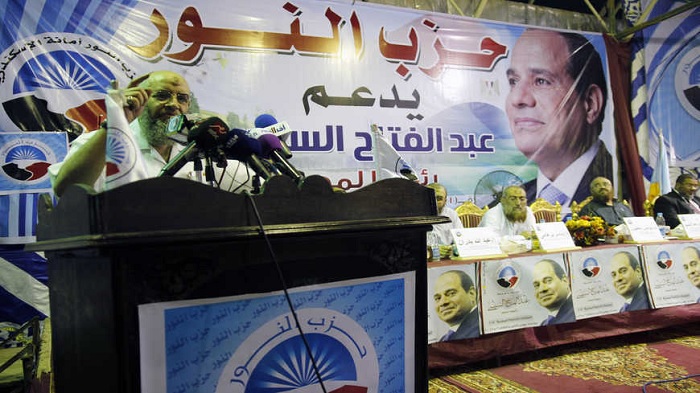
Although the Salafist Nour party failed to secure any seats in the Senate, Egyptian President Abdel Fattah al-Sisi decided to appoint two party representatives to the Senate.
Ashraf Thabet and Mahmoud Turky, two members of the Salafist Nour party, took the oath of office Oct. 18 at the Senate opening session. President Abdel Fattah al-Sisi had appointed them as representatives of the Nour party in the Senate, the parliament’s upper house.
Turky, as the youngest Senate member, assisted Lt. Gen. Jalal Haridi, the most senior member, in running the inaugural session of the Senate.
In a statement Oct. 17, the Nour party thanked Sisi for appointing two of its members to the Senate, as part of the 100 members the president appoints to the 300-member Senate.
The presidential decision to appoint two members of the Nour party came after all of the party’s 16 candidates failed to secure any votes in the Senate elections in August.
In 2012, the Nour party came in second in the Shura Council, which is the Senate now, after the Freedom and Justice Party, the Muslim Brotherhood’s political arm, secured 45 out of 270 seats during the council’s elections.
The Nour party’s failure in the Senate elections did not prevent it from running in the Egyptian parliamentary elections on Oct. 24-25. Some 12 candidates of the party ran for individual seats, as the party did not join any electoral lists or electoral alliances with other parties.
The Nour party has 12 seats in the current parliament. In 2012, it secured 96 out of 498 seats in parliament, ranking second in the Egyptian parliament after the Freedom and Justice Party.
The Nour party, the political wing of the Salafist Dawa party, was established on June 12, 2011, following the January 25 Revolution and the fall of President Hosni Mubarak. The party is considered one of Egypt’s first Salafist parties to participate in political life.
Maher Faragli, head of the Cairo-based Zat Masr Center, which focuses on the affairs of Islamic groups, told Al-Monitor, “The Nour party has supporters among the Salafist movement in the Egyptian street and must be represented in the Senate.”
He said, “The state is avoiding disputes with political Islam currents, especially in light of the tension between the ruling regime and the Muslim Brotherhood. Thus, it is keen to consolidate its relationship with the Nour party.”
Faragli added, “The Nour party has supported all of the ruling regime’s positions since the ousting of President Mohammed Morsi, even though the regime opposes their former ally, the Muslim Brotherhood.”
The convergence of views between the government and the Nour party has become more apparent recently. On Sept. 24, the party announced in a Facebook post its rejection of the demonstrations against the state, and said that those calling for them are implementing foreign schemes and approaches of violence, chaos and sabotage.
In January 2018, the Nour party had announced its support for Sisi’s candidacy for a second term, and held public forums in support of that candidacy in the 2018 presidential elections.
Faragli said, “The Nour party wants to be a representative of the Islamist current in political life, and the state wants that too. The party is securing a representation in any representative body.”
He noted, “The next parliament will include representatives of the Nour party even if the latter fails in the parliamentary elections. That would be an affirmation that the state does not exclude the Islamist currents.”
A total of 568 seats in parliament will be allocated evenly between individuals and party lists, while Sisi will choose an additional 28 seats.
Faragli continued, “The Nour party’s presence in the Senate is a message to foreign parties that the state does not target any Islamist current, and that its crisis with the Muslim Brotherhood revolves around their violent approach in expressing their views.”
He said, “The state is also keen to have the Nour party represented in order to contain the Salafist youth, and prevent the Brotherhood from mobilizing them in their battle against the state.”
Ammar Ali Hassan, a journalist and political science researcher, told Al-Monitor, “The military establishment used the Nour party as the front of the Islamist current when Sisi — who was defense minister at that time — announced on June 30, 2013, the removal of Morsi. The aim [of this rapprochement] was to counter the jihadist-Brotherhood alliance against the army.”
Nour party Secretary-General Galal al-Murra had taken part in the Military Council’s meeting of July 3, 2013, which ended with a statement ousting Morsi.
Hassan said, “The Nour party was subject to a defamation campaign by the Muslim Brotherhood and pro-Brotherhood media because it failed in the Senate elections. The state appointed its representatives in the Senate as an act of gratification.”
The pro-Brotherhood sites launched a campaign against the Nour party for failing to secure enough votes in the Senate elections, and accused the ruling regime of leaving the Nour party behind despite its support for Morsi’s ouster.
Hassan noted, “The Muslim Brotherhood has launched a campaign against the authorities, accusing them of being against Islam and biased toward secularists and Christians. Hence, the ruling regime was keen to have the Salafist Nour party represented — even in a minimal way — in the Senate in order to bring about balance.”
He stressed that “the state will not allow the next parliament to be devoid of representatives from the Nour party, even if it fails in the parliamentary elections.”
Hassan concluded, “The state did not want to appoint more than two members of the Nour party, so that the party would not be able to form a parliamentary bloc capable of having an influential position in any vote on the draft laws. This way the party’s representation would remain minimal in the Senate without having a remarkable influence.”
 Eurasia Press & News
Eurasia Press & News



